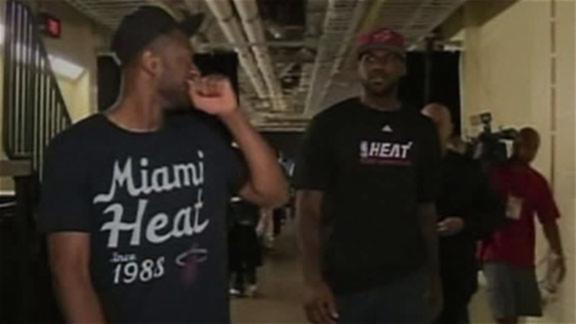Exhibit A:
Exhibit B:
The rule about microphones is just a simple precaution to make sure anchors and reporters don't make mistakes that could embarrass them or even cost them their jobs.
Athletes could learn to avoid controversy by following some similar rules. In today's media world, news travels fast. That means good news, bad news, and incorrect news all spread very quickly. So, for those athletes willing to listen, I offer a pair of simple tips:
1. If you wouldn't say it at a press conference, don't say it on Twitter.
Seattle Seahawks wide receiver Golden Tate learned this recently (the reason I was inspired to throw this advice out there). Tate, during the ESPY awards tweeted "Jimmie Johnson up for best athlete?? Um, nooo... Driving a car does not show athleticism." NASCAR fans were immediately all over him. I know that if there's one hot button issue with NASCAR fans, it's people saying that their drivers are not athletes. Tate had to deal with all of the angry tweets, and it even became a story on ESPN.com's front page.
He's not the first (and won't be the last) athlete to speak his mind on Twitter and deal with backlash. After Osama Bin Laden was killed, Steelers running back Rashard Mendenhall appeared to come to Bin Laden's defense on Twitter. He said he couldn't believe America was celebrating the death of a person they didn't know and that America didn't know "both sides." He went on to say that America didn't know what really happened on 9/11 and that he found it hard to believe a plane could take down a building by itself. While he may not be the first American to throw out that conspiracy theory, he was the latest and he had to deal with the anger and backlash.
Athletes need to understand that Twitter is becoming a bigger and bigger part of the media landscape. Reporters everywhere follow as many athletes as they can find, and if something controversial pops up on their Twitter feed, they'll be happy to report it as if they spoke to the athletes themselves.
I'm not famous, and I only have about 400 followers compared to Tate's 21,000 and change, but I still watch what I say on Twitter. It's out there in the public, and anyone can see it. I avoid anything controversial or anything that could be misunderstood as bigoted because all it takes is a handful of retweets to spread the rumors to hundreds of people who don't know me, and then the backlash comes. Athletes should approach Twitter with the same caution. I'm not calling for censorship. Tweet whatever you want, but be prepared for the response if you say something stupid.
2. Treat every camera as if it's broadcasting to the entire world.
Follow this rule because if you do or say something controversial, that camera essentially is going out to the entire world. If it's a television camera, it only takes a few minutes to upload the video to a server from which any station in the world can download and put on its broadcast. If it's a fan with a smart phone, it takes seconds to upload to YouTube.
 |
| Go ahead, guys, make a joke in front of the camera. Wait until you see what the media does with the video. |
Dwyane Wade and LeBron James could have followed this advice during the NBA Finals. Heading into a critical Game 5, they decided to walk around like idiots mocking Dirk Nowitzki's flu. The media made a story out of it, and there was quite a buzz about it heading into the last two games of the finals. They responded by saying they knew the camera was there and were just playing up for the camera to see if the media would make a big deal out of it. Well, mission accomplished, fellas. We did, and you looked like jerks. Meanwhile, Dirk and the Mavericks remained focused and took the NBA championship you thought you were entitled to.
Memo to athletes: if you say or do anything dumb or controversial in front of a camera, we will be happy to use it however we want. If there's a video like the mocking of Dirk that will drive up page views on a website or get people to watch a newscast, you bet it's going to be used. Act like a professional in front of every camera, and you'll be just fine.
 |
| When it comes to TMZ cameras, just say no. Actually, don't even say no. Just walk away. |
TMZ seeks nothing but controversy and will run with absolutely anything that is remotely controversial. If you say something really outrageous, you will regret it big time. USC Marc Tyler could not have been any dumber when, during a night on the town, he told TMZ that USC pays more than the pros. Joking or not, it got him suspended from USC. So, whether you only say one word like Kevin Durant did or you say the dumbest thing imaginable like Tyler, TMZ will get you. Just walk away.
Athletes need to understand how quickly things travel in today's media world. Be careful what you say and who you say it to. It's okay to be funny and entertaining. Shaq mastered that. Just know that if you want to say or do something controversial, it'll spread quickly.
No comments:
Post a Comment